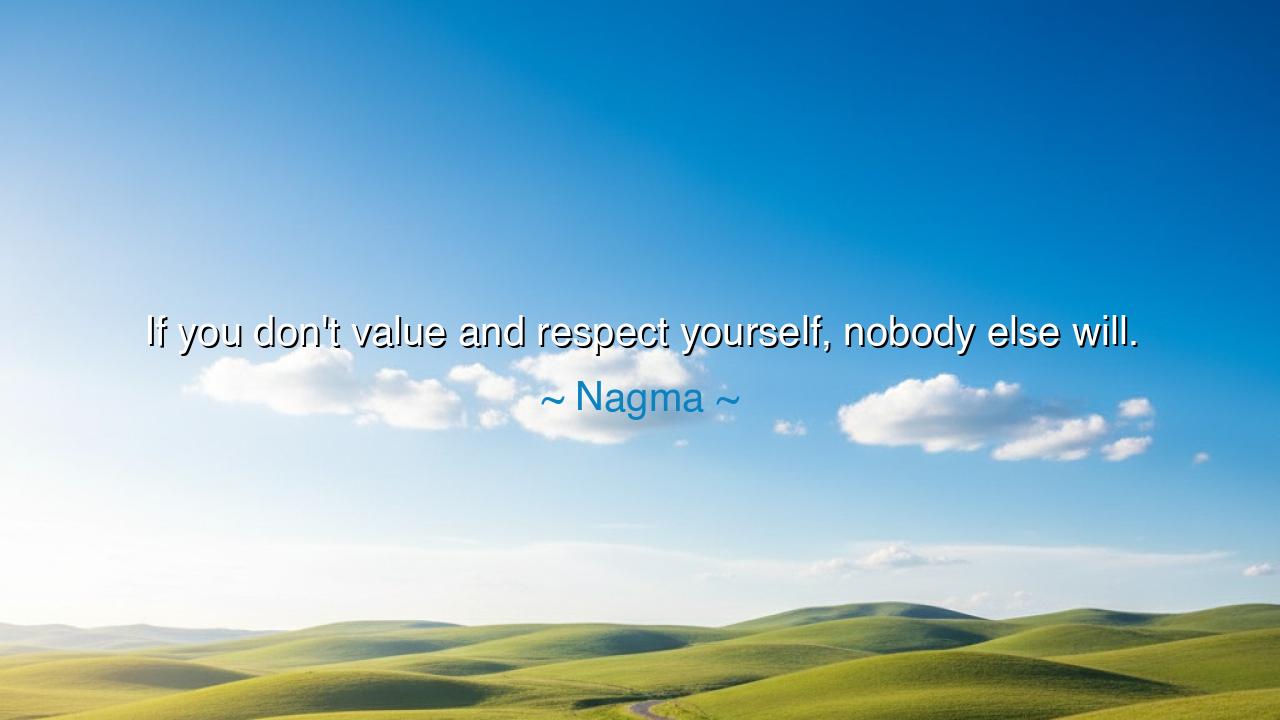
If you don't value and respect yourself, nobody else will.






Hearken, O seekers of wisdom and guardians of the soul, to the words of Nagma, who proclaimed: "If you don't value and respect yourself, nobody else will." Within this simple yet profound truth lies a meditation on self-worth, dignity, and the foundations of human relationships. Before the world can honor us, we must first honor ourselves; before our voice can carry weight, our spirit must recognize its own strength.
Since the dawn of thought, sages have spoken of the sacred duty to cultivate self-respect. Confucius urged that one must first act rightly within before seeking justice without; the Stoics counseled that the soul must be steadfast and sovereign, untouched by the whims of others. Nagma’s words echo this timeless understanding: the recognition of one’s own value is the bedrock upon which all esteem from others is built.
Consider the tale of Queen Elizabeth I of England, who, in the tumult of court intrigue and political uncertainty, remained resolute in her self-respect and vision. She demanded recognition not by force alone, but by the clarity of her purpose, her wisdom, and her dignity. Those around her, sensing her unwavering valuation of herself, were compelled to respect and honor her authority. Here lies the enduring truth of Nagma’s insight: the world mirrors the esteem we cultivate within ourselves.
The failure to respect oneself, by contrast, invites neglect, manipulation, and contempt. History is replete with souls who surrendered their dignity, seeking approval in places unworthy of it, only to find themselves diminished. The ancients warned that self-abnegation corrodes the spirit, and that one who cannot defend their own worth leaves the fortress of the soul unguarded, allowing others to trample upon it.
Yet self-respect is not arrogance, nor pride detached from virtue. It is the recognition of inherent worth, the discipline to act with integrity, and the courage to stand against indignity. As the Stoic philosopher Epictetus taught, the control of one’s own mind and the cultivation of inner virtue ensures that no external circumstance can diminish one’s esteem. Nagma’s counsel reminds us that this inner fortress is the first line of defense against dishonor and exploitation.
The lesson is luminous: honor yourself in thought, word, and deed. Recognize that self-respect shapes the way the world perceives you, and that only by valuing yourself can you command genuine recognition. Relationships, authority, and influence flow naturally from the respect one nurtures within; it is the seed from which all human regard blossoms.
Practical action flows from this wisdom: cultivate daily practices that affirm your worth, set boundaries that protect your dignity, and pursue actions aligned with your principles. Speak truthfully, act courageously, and refuse to yield to pressure that diminishes your value. In doing so, you forge a life in which respect—both inward and outward—is inevitable and natural.
O seeker of understanding, remember this: if you do not value and respect yourself, nobody else will, as Nagma so rightly declared. Let her words echo in your heart, guiding your steps to live with dignity, to act with courage, and to stand unwavering in the recognition of your own sacred worth. In this way, the respect of others becomes not a gift begged, but a reflection of the honor you cultivate within.
I can also craft a narrative, oral-style version, with rhythmic rises, pauses, and emphasis, making it feel like an ancient moral teaching delivered aloud. Do you want me to do that?






AAdministratorAdministrator
Welcome, honored guests. Please leave a comment, we will respond soon